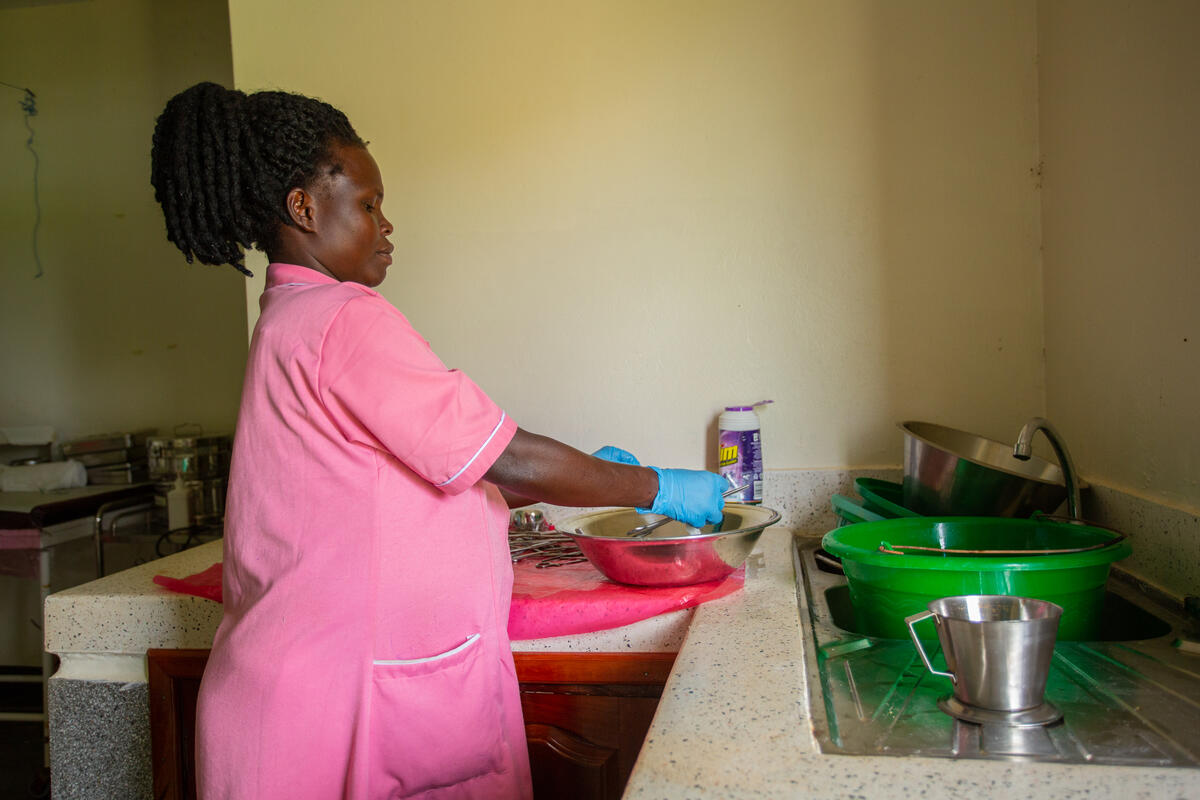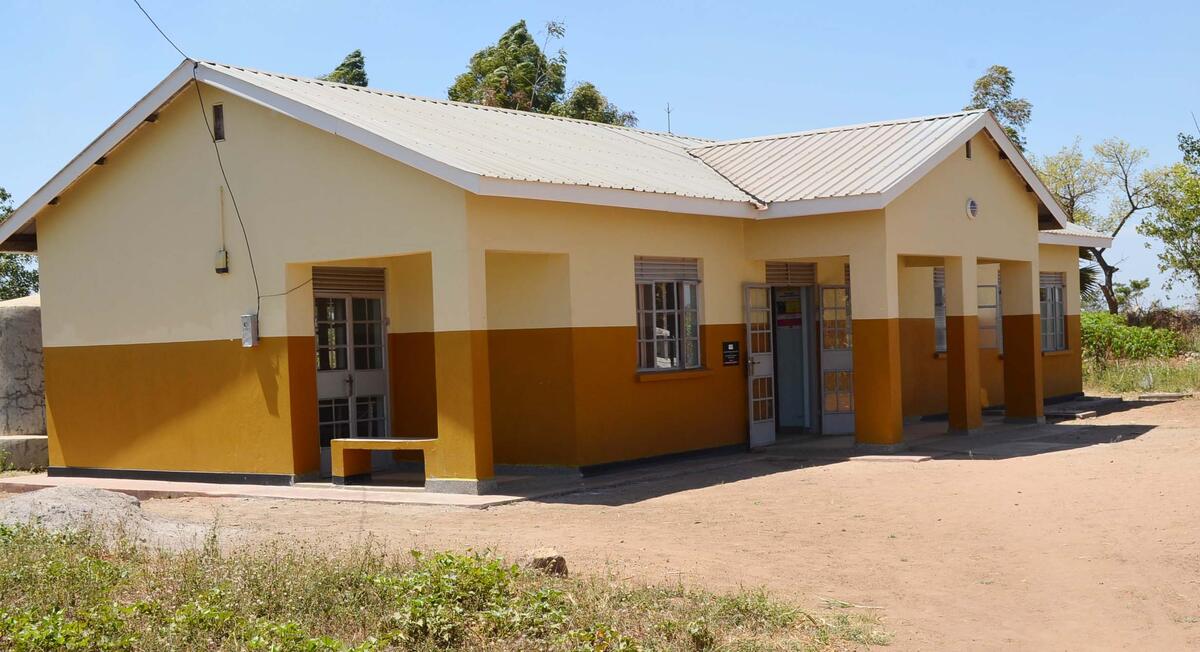Lack of access to water, sanitation and hygiene (WASH) services has a huge impact on citizens in Uganda. In this article, Comfort Hajra Mukasa, Programme Manager, Water, Sanitation and Hygiene at Amref Health Africa, outlines the impact, and describes how connecting WASH and health systems has had a transformative effect on six healthcare facilities in the Amuru district, and those who use them.
Published on: 24/01/2023
Author: Comfort Hajra Mukasa of Amref Health Africa

Delivery room work station improved with Terazzo and running water for infection control and prevention. Photo credit: Amref
However, it is 2023 and 13.8 million Ugandans (six per cent of the population) still share latrines and 3.2 million (nearly a tenth of the population) still defecate in the open. Only 35.8% of Ugandans in rural areas and 53.4% in urban areas practice hand washing at critical times. It is no wonder that diarrhoea, a water born disease, is responsible for 22% of deaths of children under 5 years (33 deaths per day). Early childhood diarrhoea is not only deadly; it also contributes to Uganda’s high levels of stunting, which in turn affects children’s cognitive development and performance at school.
Limited access to WASH has further reaching consequences for the country. Ugandan government loses around 86 million (GBP) annually, because of issues including; premature death, access time, productivity losses whilst sick or accessing healthcare.
Poor people carry the greatest burden of poor sanitation. The poorest 20 percent of the population is 13.5 times more likely to defecate in the open than the wealthiest 20 percent, according to the World Bank.
This situation is even worse for women due to the fact that typically women and girls in Africa are the main provider of household water. Lack of water, sanitation and hygiene services in schools result in girls missing school because they are either travelling long distances to fetch clean water or when they reach puberty the lack of separate toilets disheartens girls to attend full time. Poor Menstrual Hygiene Management in schools contributes to a 10% drop out of girls.
Evidence shows that Universal access to safe drinking water, adequate sanitation, and hygiene has the potential to reduce the global disease burden by 10%. For a country like Uganda that has over 70% of disease burden associated with water sanitation and hygiene, sustainable access to safe drinking water, sanitation and hygiene could be the silver bullet to achieving universal health coverage and poverty eradication for the country.
However, as we think about using this silver bullet to achieve universal health coverage and eradicate poverty, we need to be mindful of the social and inherent community factors that may impede on our efforts. We need to connect WASH and health systems, by using systems approaches planning such that planners move away for linear planning and adopt inclusive circular planning.

Photo credit: Amref
In 2016, Amref Health Africa in Uganda conducted an assessment of all the health care facilities (HCFs) in Amuru district and found that:
Consequently
Amref designed an intervention that integrated WASH and Reproductive Maternal Newborn Child, Adolescent Health (RMNCAH). This would increase skilled birth attendance in order to reduce the incidence of neonatal sepsis in Amuru District (intervention in 6 HCF).
The six targeted HCFs that were conducting deliveries at that time were renovated to aid easy cleaning. In addition, Amref developed solar powered water systems to connect running water to the HCFs and the host communities to ensure that there was water for cleaning, bathing and hand washing at all the critical times by the health workers and patients. Drainable latrines were constructed in each of the HCFs to increase access to basic sanitation services. Placenta pits were constructed to support solid waste management. A mechanism for operation and maintenance of the developed WASH services was established through capacity building of the Health Unit Management committees. There was intensified sanitation and hygiene promotion in the host communities and community health workers were trained to work as the linkage between communities and HCFs to ensure systematic health education and information flow.
The intervention focused on three impact level indicators at the HCFs. Data was collected on a quarterly basis to monitor trend in indicators using the Kobo Collect survey app. Data collected was linked to district data collection system (District HMIS)
In May 2023, Dr Githinji Gitahi, Group CEO, AMREF Health Africa, will be joining other changemakers, experts and decision-makers in The Hague to discuss these and other issues. Bookings are now open – find out more below about how he and others will be connecting people and ideas, systems and solutions to achieve justice for all.
In May, IRC, an international think tank that actively builds strong water, sanitation and hygiene systems and Water for People, a global nonprofit, and their partners, will host the All Systems Connect International Symposium 2023. The Symposium is designed to help people working in health, WASH, climate and social justice to connect with purpose, work on collective solutions, and strengthen their capabilities as systems leaders.
Partners include the World Health Organisation, UNICEF, the Conrad N. Hilton Foundation, Sanitation and Water for All, Government of the Netherlands, Osprey Foundation, and World Vision.
Speakers so far include: Dr Githinji Gitahi, Group CEO, AMREF Health Africa; Mariana Mazzucato, Professor in the Economics of Innovation and Public Value at University College London, Co-Chair of the Global Commission on the Economics of Water; Dr Kodjo Esseim Mensah-Abrampa, Director General National Development Planning Commission, Republic of Ghana; Neeta Pokhrel, Chief of Water Sector Group, Sustainable Development and Climate Change Dept, Asian Development Bank; Hajar Yagkoubi, Youth Inclusion Expert and former UN Youth Representative for the Netherlands.
We encourage you to join us, to connect with new allies, fresh thinking, and inspiring ways to strengthen systems and services.
At IRC we have strong opinions and we value honest and frank discussion, so you won't be surprised to hear that not all the opinions on this site represent our official policy.